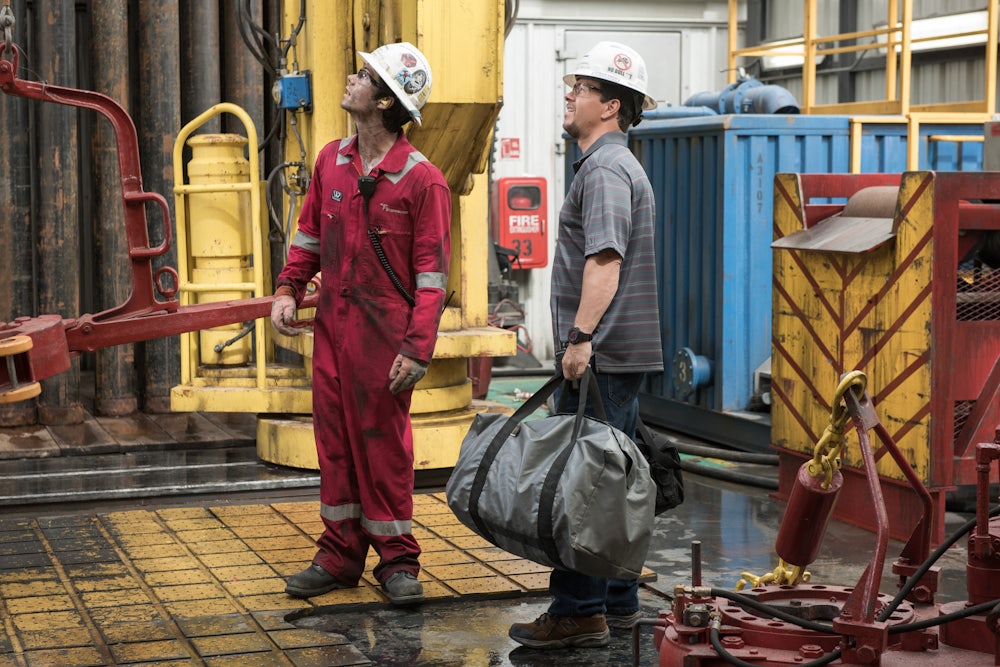Peter Berg is a filmmaker with a fascinating career. As an actor, he was a reliably shifty presence, excellent at playing characters with hazy moral centers. But Berg’s goal all along was to be a director, starting with bro-junk like Very Bad Things (1998), upgrading to Friday Night Lights (2004) and The Kingdom (2007), and then crashing and burning with the insane, hit-your-head-with-a-brick dumb Battleship (2012). It’s as if the phoniness of that film snapped something in him: Not only was Berg not doing any more Hollywood bullshit, he would veer in the exact opposite direction. He would return to real-life stories about regular people—usually men, or to be more specific, men’s men—who find themselves in extraordinarily circumstances. Lone Survivor, about a team of Navy SEALs on the run from the Taliban, and the upcoming Patriots Day, about the Boston Marathon bombings and ensuing manhunt, are no-nonsense, stripped down, deeply masculine just-the-facts tick-tocks that seem designed solely to satisfy the claim “based on a true story.”
Berg’s latest film, Deepwater Horizon, is based on the 2010 oil rig explosion that killed 11, injured hundreds, and caused the largest oil spill in U.S. waters, which flowed for 87 days before it was capped. The film focuses on the facts of the explosion itself, showcasing Berg’s Michael Bay-level skill with pyrotechnics. Think of Peter Berg as Bay-Lite, and in this case that’s very much a compliment. The pair might be considered two sides of the same cinematic coin—Bay even attempted a Berg film with his Benghazi movie 13 Hours, but he couldn’t scrub away all the Michael Bay-ness. Berg’s skill is that he never loses sight of the fact that he’s trying to do right by the people involved. And while Deepwater Horizon doesn’t have many compelling characters (or much wit or dexterity), it does tell its brawny story in an undeniably effective fashion. Your parents are going to love this movie. And you might love it too.
Another constant of the new Peter Berg is that his movie star Mark Wahlberg—an actor who seems more convinced of his Ordinary Guy-ness than I am—and here he plays Mike Williams, the chief electrical officer on the rig. There’s not much to Mike, and that’s by design: He’s a likable guy who loves his wife (Kate Hudson) and family and, helpfully, seems to know everyone on the ship. (We get a good pre-explosion tour of the place as he goes around saying hello to everyone.) He’s a loyal soldier to Mr. Jimmy (Kurt Russell), who believes that the BP executives, represented by a sniveling, drawling Cajun played in an amusingly over-the-top fashion by John Malkovich, are attempting to pinch pennies by skimping on safety tests and inspections. He is almost immediately proven correct when an oil blowout causes an explosion that sets the entire ship ablaze.
Have no doubt: This is terrifying. Berg’s signature skill might be to make Towering Inferno-level horrors feel like they have a human scale, and you end up invested in all these workers trying to get off the rig even if they haven’t given you enough personality to necessarily care about them all that much. Berg takes the cue from his no-nonsense characters and you feel their peril: Particularly effective is Gina Rodriguez’s Andrea, one of the ship’s navigators who is believably both strong-willed and absolutely petrified as her ship dissolves around her. (It’s hard to stand out when your character has no real traits other than “scared of the fire,” but she pulls it off.) Russell is perfectly crusty as the old ship captain; he’s full entrenched in his Tom Skerritt phase. As for Wahlberg? I’ll confess, I prefer him far more when he’s playing weirdos (The Departed, I Heart Huckabees) than when he’s trying to convince us of his own heroism. But, if nothing else, he fills out a screen, which is all Berg ever asks him to do. He does not trip over the props.
By the end of the film’s brisk 100 minutes, you’ll be wrung out and spent, which is Berg’s goal: He is doing nothing more than trying to replicate an experience. This puts a ceiling on his ambition, but Berg has reached a point in his career that his only ambition it to try to get it right. Deepwater Horizon is powerful but limited—but there are worse crimes.
Grade: B
Grierson & Leitch write about the movies regularly for the New Republic and host a podcast on film. Follow them on Twitter @griersonleitch or visit their site griersonleitch.com.
